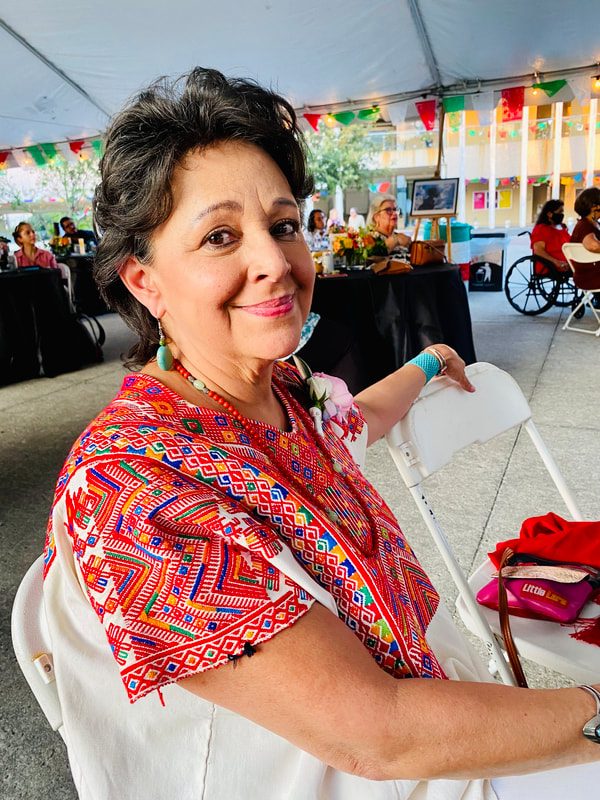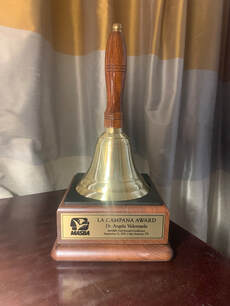|
Angela Valenzuela receives Lifetime Achievement Award from the Emma S Barrientos Mexican American Cultural Center, Sept. 18, 2021
Recent Awards and Recognitions
|
About AngelaAngela Valenzuela is a professor in both the Educational Policy and Planning Program within the Department of Educational Leadership and Policy and a courtesy appointment in the Cultural Studies in Education Program within the Department of Curriculum & Instruction at the University of Texas at Austin where she also serves as the director of the Texas Center for Education Policy at the University of Texas at Austin.
A Stanford University graduate, her previous teaching positions were in Sociology at Rice University in Houston, Texas (1990-98), as well as a Visiting Scholar at the Center for Mexican American Studies at the University of Houston (1998-99). In 2007 as a Fulbright Scholar, she also taught in the College of Law at the University of Guanajuato in Guanajuato, Mexico. She is also the author of award-winning book, Subtractive Schooling: U.S. Mexican Youth and the Politics of Caring, Leaving Children Behind: How “Texas-style” Accountability Fails Latino Youth, and Growing Critically Conscious Teachers: A Social Justice Curriculum for Educators of Latino/a Youth. Dr. Valenzuela served as an expert witness on curriculum in Arce, et. al. v. Douglas,793 F. 3rd 968 (2015) where Mexican American Studies plaintiffs prevailed and the dismantling of Tucson Unified School District’s MAS program was found unconstitutional both in enactment and enforcement by Judge A. Wallace Tashima. 269 F. Supp. 948 (D. Ariz.2017), citing violations to the Equal Protection Clause of the Fourteenth Amendment and the First Amendments. Currently, Dr. Valenzuela co-chairs the LULAC National Committee on Higher Education and is the Executive Director of the National Latina/o Education Research and Policy Project (NLERAPP), a consortium of ten institutions that enhances teaching for high school youth in Texas, California, Wisconsin, Chicago, New York, Colorado, New Mexico, and Arizona. Her most recent accomplishment is getting inducted into the 2021 cohort of the National Academy of Education. She also founded and operates an education blog titled, Educational Equity, Politics, and Policy in Texas: http://texasedequity.blogspot.com/ Currently in its eighth year of operation, she is also a co-founder of Academia Cuauhtli, a language and cultural revitalization initiative located at the Emma S. Barrientos Mexican American Cultural Center in Austin, Texas. Valenzuela’s research and teaching interests are varied and interdisciplinary in the sociology of education, minority youth in schools, education policy, Chicana feminist scholarship, urban education transformation, and Indigenous Education. |
Who I am
|
My Journey
|

I am a professor, researcher, published scholar, community advocate, policy activist, and blogger that blurs the lines between her personal, professional, social, and public identities. You can find my blog here. This online portfolio speaks to my commitment to not simply leave a "digital footprint," but like Mahatmas K. Ghandi once said, "To be the change that I want to see in the world."
Hobbies
When I am not doing academic or community work, I like to go on long walks, work in my garden, hang out with my women friends, attend community events, and play with our beautiful grandchildren. These many months of the pandemic has mad getting together difficult, but we Facetime regularly and when we do get together, we sense little, if any, strain in our familial relationships, including with our grandkids, thankfully.
|
Not unlike the field of Mexican American Studies, in general, of central importance in much of my work and thinking is the question of identity. Who am I? Where do I come from? Who are we? From where do we come? This preoccupation not only grows out of my having lived a female, Mexican American experience in West Texas, but is in fact one of the overwhelming, substantive concerns of this field of study.
The reason that this is so is because schools and society require that we, as Latinos/as, and people of color, generally, participate in the rejection of one side of one’s heritage through the cultural and linguistic assimilation process. This often means that a healthy connection to self fails to form. And then we wonder why children fail in schools. Consequently, as a Mexican American, reconciliation with oneself—inasmuch as it is a "rejected self"—requires an engagement with the Indigenous roots of one’s identity in order to both honor our ancestors and promote a unified sense of self. |


